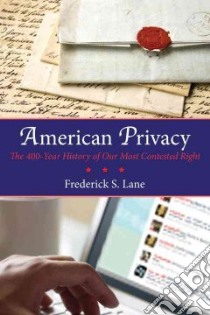American Privacy - 9780807044414
Un libro in lingua di Lane Frederick S. edito da Random House Inc, 2009
- € 24.30
- Il prezzo è variabile in funzione del cambio della valuta d’origine
A sweeping story of the right to privacy as it sped along colonial postal routes, telegraph wires, and today's fiber-optic cables on a collision course with presidents and programmers, librarians and letter-writers.
"The history of America is the history of the right to privacy," writes Frederick S. Lane in this vivid and penetrating exploration of our most hotly debated constitutional right. From Governor William Bradford opening colonists' mail bound for England, to President George W. Bush's expansive domestic wiretapping, the motivations behind government surveillance have changed little despite rapid advances in communications technology. Yet all too often, American citizens have been their own worst enemies when it comes to protecting privacy, compliantly forgoing civil liberties in extreme times of war as well as for everyday consumer conveniences. Each of us now contributes to an ever-evolving electronic dossier of online shopping sprees, photo albums, health records, and political contributions, accessible to almost anyone who cares to look. In a digitized world where data lives forever, Lane urges us to consider whether privacy is even a possibility. How did we arrive at this breaking point? American Privacy traces the lineage of cultural norms and legal mandates that have swirled around the Fourth Amendment since its adoption. In 1873, the introduction of postcards split American opinion of public propriety. Over a century later, Twitter takes its place on the spectrum of human connection. Between these two nodes, Anthony Comstock waged a moral crusade against obscene literature, George Orwell penned 1984, Joseph McCarthy hunted Communists and "perverts," President Richard Nixon surveilled himself right out of office, and the Supreme Court of the United States issued its most influential legal opinions concerning the right to privacy to date. Captured here, these historic snapshots add up to a lively narration of privacy's champions and challengers. Legally, technologically, and historically grounded, American Privacy concludes with a call for Congress to recognize how innovation and infringement go hand-in-hand, and a challenge to citizens to protect privacy before it is lost completely.
Informazioni bibliografiche
- Titolo del Libro in lingua: American Privacy
- Sottotitolo: The 400-Year History of Our Most Contested Right
- Lingua: English
- Autore: Lane Frederick S.
- Editore: Random House Inc
- Collana: Random House Inc (Hardcover)
- Data di Pubblicazione: 01 Novembre '09
- Genere: HISTORY
- Argomenti : Privacy, Right of United States History Government information United States History Confidential communications United States History
- Pagine: 282
- Dimensioni mm: 234 x 165 x 31
- ISBN-10: 0807044415
- EAN-13: 9780807044414


